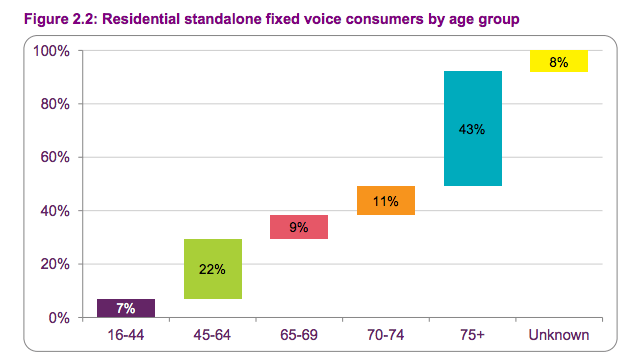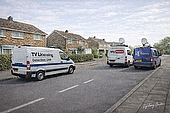Home > TV & Broadband > News > Ofcom to cut BT landline-only bills by at least £5 a month
Ofcom to cut BT landline-only bills by at least £5 a month
OFCOM have announced they're planning to cut the bills of BT landline-only customers, reducing the monthly fee from £18.99 to as much as £11.99.

This price cap arrives as part of the regulator's review into the market for standalone phone services, which has found that landline-only customers "have not benefited from competition in the same way" as those who buy media bundles including broadband, TV, and landline services.
Because of the lack of effective competition, line rental prices rose by as much as 49% between 2009 and 2016, despite wholesale costs falling by 26% over this period.
It's mostly for this reason that Ofcom have imposed the price control, yet there's a worry that by setting a limit on what BT can charge for standalone landlines, their broadband and TV fees may go up as a result.
Little competition
To put things in perspective, there are 2.9 million people in the UK who pay for their landline separately.
In contrast to those who buy bundled landline services, a greater proportion of this 2.9 million are elderly and/or vulnerable, with Ofcom estimating that "around 43% of BT's standalone fixed voice customers are aged 75 or older".

Source: Ofcom
Similarly, 47% of voice-only customers live in DE socio-economic group households, meaning that they're either in semi-skilled or unskilled work, or they're not in work at all. This is considerably higher than the 20% of "dual-play" customers who reside in DE households.
Added to this, Ofcom also found that "70% of standalone landline customers have never switched provider or considered doing so".
This isn't only because their particular circumstances make them less likely to switch, but also because there's considerably less choice in the standalone fixed voice market.
For example, BT has a 79% share of this market, while their nearest competitor - the Post Office - has only between 5% to 15% (an exact percentage isn't given).
As a result of this dominance, BT have been able to steadily increase prices since 2009, so that even with a 26% drop in wholesale prices they've been charging their customers anything from 25% and 49% more in real terms.
In light of this, Ofcom have understandably decided that a price cap is necessary, so that those who rely on landlines aren't unfairly penalised for the market's failure to offer competitive alternatives.
Reaction
While the cap is still in the consultation stages and therefore doesn't have a specific launch date yet, Ofcom have stated that it will reduce monthly fees by anything from £5 to £7.
This will be a cut not just for those who have a phone line but no internet, but also for those who mix and match their services, taking a standalone landline from BT and broadband access from Plusnet and Virgin Media, for instance.
With the £5 or £7 monthly cap, standalone voice customers will save £60 or £84 a year, a reduction which has already been welcomed by several consumer groups and charities.
Gillian Guy, the CEO of Citizens Advice, said, "The plan Ofcom has announced today to help reduce the bills of elderly and vulnerable people is a really positive move - and we'd like to see similar actions in other markets, starting with energy".
Conversely, BT's response was more defensive, with the telecoms provider noting, "We take our responsibilities in this area very seriously," and affirming that they already have packages in place for vulnerable customers and those on a budget.
These include BT Basic, which enables those on certain benefits to pay only £5.10 a month for a phone connection.
Yet while this fee - which won't be directly affected by the new price cap - is unquestionably low, BT Basic is accessible only to those in receipt of pensions or universal credit, thereby neglecting millions of people who nonetheless have to pay over the odds because of the absence of competition.
Price rises for everyone else?
However, even if Ofcom's cap is set to redress this neglect, there's a possibility that it might come at a price, at least for BT's other customers.
This is because, with a monthly £5 reduction given to 2.9 million customers, the price control works out at £14.5 million a month, or £174 million a year.
And if Ofcom ends up going with a £7 reduction, the yearly bill would come to £243.6 million.
This would equal 43% of the £526 million in profit BT reported for the three months leading to December 2016, a proportion that would put serious pressure on the telecoms provider to increase their fees elsewhere.
However, given that they're already under enormous political pressure with regards to such issues as the legal separation of Openreach, a price rise for their bundled customers isn't something they could pull off without receiving a fair amount of scrutiny from Ofcom.
This is why, for the time being at least, the regulator's introduction of a cap is very welcome news, especially since the past few years of price rises would suggest that standalone phone customers may have been subsidising recent price cuts for everyone else.

We are independent of all of the products and services we compare.

We order our comparison tables by price or feature and never by referral revenue.

We donate at least 5% of our profits to charity, and we aim to be climate positive.
Latest News

13 February 2026
Sky TV bundles Netflix, Disney+, HBO Max and hayu
13 February 2026
Telecoms Consumer Charter promises no surprise bill hikes
8 February 2026
TV licence to rise to £180 from April 2026Receive consumer updates that matter in our newsletter


